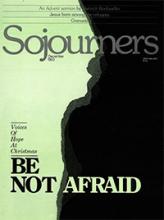We don't talk about it much. Sometimes we talk about how we're not talking about it. We take in tragedy upon tragedy—from a military compound in Beirut, a mental hospital in Grenada, a border town in Nicaragua. We analyze the facts, discuss the details, feel all that we feel. But we don't talk much about the fear; about this sense that the world is about to blow.
The children are more honest. A mother told me last week that she heard her 12-year-old daughter crying herself to sleep one night. When she went to her daughter's side and asked her why she was crying, she answered, "I'm afraid that we're all going to die in a nuclear war."
We fear nuclear war and all the tragedies short of it. We fear death, but maybe even more we fear life in a world controlled by those who believe that the solution to every crisis is to deploy either missiles or Marines. And we wonder sometimes whether all that is good on earth will be blown away in an instant by nuclear fire, or slowly snuffed out by the crushing power of oppressive military might as it rolls over the globe.
We live in a world that seems about to drown itself in its own tears. The cries come from every corner. And every ray of hope seems so fragile, so easily stamped out or swallowed up by the darkness. Despair threatens to take up residence in our hearts.
We weep, we protest, pray; and ultimately we find that we can only cry out, "Lord, have mercy."
We are all in need of mercy these days. We need salve for our wounds and our fears. We need Jesus.
It often seems that the realities that can lead us to despair are more concrete than the signs of hope. In this issue of Sojourners we offer voices of hope that speak of faith and celebration in dark times.
Read the Full Article

